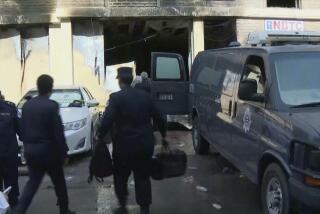Foreign Workers in Kuwait Brace for a Possible War
KUWAIT CITY — The last time war came to the Persian Gulf, Mushtaq Amhad, a Pakistani barber, was lucky to escape with his life.
As Iraqi troops overran downtown Kuwait City and smashed his shop windows, Amhad and his cousin, Mohammed Akram, managed to get in a car and away from the chaos. They drove out of the country the fastest way they could -- north, straight into Iraq. They drove for days, into Turkey, through Iran, an ordeal that eventually took them to their hometown near Lahore.
With the region again on the verge of war, and the two men working in the same barbershop as before, it is hardly surprising that they desperately hope that they will fare better this time.
“Maybe it will be quick, and I think maybe Kuwait will be protected this time,” said Amhad, 50, a wiry, mustachioed man who keeps up a steady patter of animated conversation in Arabic, Urdu and English with the customers who come to his shop.
Gesturing to the north, the path of his desert escape route in 1990 but also now a place where more than 40,000 American troops are massed near the Iraqi border, Amhad said: “I do not wish to go through what we went through before.”
Although world attention has focused on how Arabs view the possibility of war, this region has even larger numbers of residents from overseas. In Kuwait, for instance, more than half of the 2.1 million people are noncitizens, expatriates who come to earn money that they send home.
These are people who cannot vote but do the work -- construction, cooking, fishing, staffing the oil fields, cleaning the houses and hotels -- that Middle Easterners can afford to avoid because of their oil-generated wealth.
The expatriates are predominantly from Asian nations that include the Philippines, Bangladesh, India, Pakistan and Sri Lanka, and their plight in this troubled region is a huge issue back home. There, anxious relatives worry about their safety and demand that government leaders in the home countries come up with plans to protect or even evacuate their fellow citizens in the event of war.
Such concerns were underscored this month when President Gloria Macapagal Arroyo of the Philippines, which has 1.5 million of its citizens in the Middle East, flew to Kuwait to try to reassure workers that their government was looking out for them. About 60,000 Filipinos live in Kuwait, and they are believed to be at risk if war breaks out with neighboring Iraq, which has vowed to punish Kuwait for allowing American troops to be based in the emirate.
“I am here to bring you the message that your families back home live and breathe for you,” Arroyo said at a reception for hundreds of Philippine workers at a tent in Kuwait’s Bayan Palace. “I am here to bring you the message that we will do whatever it takes to keep you out of harm’s way,” she added.
Arroyo’s visit was not without a political undertone -- a bill expected to clear Congress in Manila soon would allow many citizens to vote from overseas in next year’s presidential election. Overseas workers send home about $6 billion annually, a huge boost to the island nation’s struggling economy.
But many Filipinos seem less concerned with the politics of their power as a voting bloc than with the practicalities of avoiding a potential chemical attack.
“We need gas masks,” said Marichale Sarah Santos, a maid. “Can you tell me how we can get gas masks?”
Both the Philippine and Kuwaiti governments say they are working on such plans, but with war believed imminent, few details are available. The Kuwaiti government says it plans to subsidize the purchase of a mask for anyone who wants one. However, it is unclear how foreigners can apply for such aid, and the price of an effective mask, $300 or more, is beyond the reach of many workers earning an average of $200 a month.
Jhon Quilala, 43, a car mechanic, said that he is fending off nearly daily calls on his cellular telephone from his wife, Ilene, who lives in the northern Philippines with their three children.
“She keeps saying, ‘What are you doing there? War is coming, you must get home,’ ” Quilala said one evening after stepping out of one of the remittance centers from which workers can wire money back home.
“So I tell her, ‘Don’t worry, don’t worry, nothing bad will happen to me,’ ” Quilala recounted. “And if it gets really bad, then I will come home.”
But he was not able to get back home the last time, in 1990, when Iraqi troops invaded. The international airport in Kuwait City was shut down and, despite his expertise as a mechanic, Quilala could not afford a car.
So he hunkered down in an apartment complex with fellow Filipinos on the outskirts of the city. The Iraqi troops left the place alone, and Quilala went back to work after American-led troops drove the Iraqi forces out months later.
“I suppose I could worry now,” Quilala said, adding that the most important thing on his mind remained his very reason for being here -- to earn enough money to send his children to college in the Philippines. “But what’s the point?”
Overseas workers often brave extreme conditions, ranging from unsafe workplaces, life-threatening desert heat and sunstroke to widespread abuse, including the sexual abuse of women employed as maids.
Many foreign workers say they are treated as near-slaves by their Middle Eastern employers, and they openly scoff at the notion that the host governments will take care of them.
Kuwait has promised that all residents, including overseas workers, will be protected -- provided with rationing cards in addition to the gas masks, if such steps prove necessary. “Everyone will be the same,” said Gen. Mustafa J. Shaban, chief of Kuwaiti civil emergency services. “There is no difference. We will take care of all the people.”
Such claims are greeted derisively by foreign workers, who recall that in the last war, many wealthy Kuwaitis fled for Saudi Arabia, leaving maids and other domestic workers to fend for themselves.
But the foreign workers also say they don’t expect much from their own governments. Bangladesh, for instance, has an estimated 157,000 workers in Kuwait, but it is an extremely poor country with little ability to spend big sums to protect or evacuate people.
Indians are the largest overseas group in Kuwait, numbering about 285,000, according to the Kuwaiti government.
The various ethnic communities have developed networks of apartment buildings, banks, bakeries, newsstands and other businesses that keep them in touch with their roots.
Although such workers are on the bottom of the economic totem pole in the Middle East, they are often major benefactors back home. Many workers earn enough to send their children, nieces and nephews to school, or to finance businesses or purchase land. And many can make enough to fly home every year or two for weeks-long vacations.
Still, many of the workers say that living in this region can be extremely bittersweet. Most say they never quite get over the homesickness, or the guilt about being apart from their children.
“It never gets easier, really,” said Karuna Ratna, 49, who works as a chauffeur. And whenever he goes home for a vacation once a year or so, the departure back to Kuwait is always a wrenching scene, said Ratna, growing quiet.
“Always they are crying,” he said, recalling how the last time he left Colombo, the Sri Lankan capital, his 18-year-old held on to his father’s pant leg, almost like a little boy.
“Why are you going back?” said Ratna, mimicking his son’s voice. “I tell him to try to understand: It’s not for me, it’s for you. I am thinking of you.”
*
(BEGIN TEXT OF INFOBOX)
Foreign work force
Many countries in the Persian Gulf have large populations of nonnationals:
*--* Nonnationals Nonnationals Country Total population Population % of total Saudi Arabia 23,513,330 5,360,526 23 United Arab Emirates 2,445,989 1,576,472 64 Kuwait 2,111,561 1,159,913 55 Iran 68,959,931 607,252 1 Oman 2,713,462 527,078 19 Qatar 697,126 516,508 74 Bahrain 656,397 228,424 35
*--*
Source: CIA
More to Read
Sign up for Essential California
The most important California stories and recommendations in your inbox every morning.
You may occasionally receive promotional content from the Los Angeles Times.










